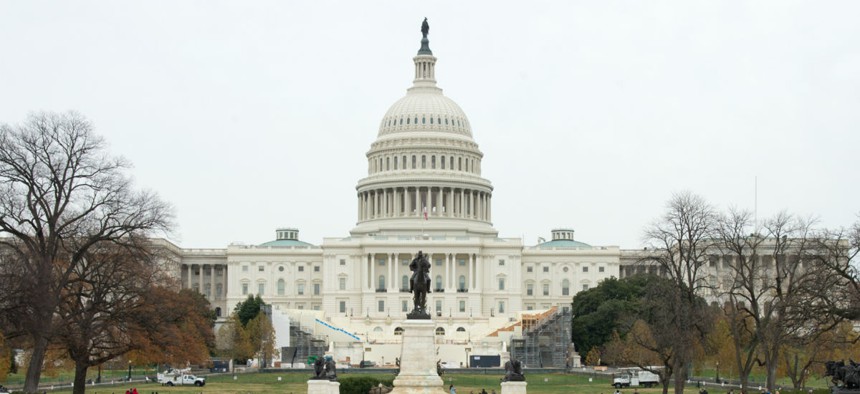
Architect of the Capitol
Lawmakers Race Against the Clock to Avoid Shutdown
Democrats say they are not involved in negotiations, are unhappy with length of CR.
This story was updated when the text of the CR was released.
Congressional negotiators are pressing to wrap up a stopgap funding measure to keep federal agencies open beyond Friday evening, when current appropriations are set to expire, introducing legislation on Tuesday evening to keep status quo spending in place through April.
Lawmakers are rushing to finish up the funding process against the Dec. 9 deadline, and the last-minute negotiations have left little room for error. Lawmakers released the text of the measure Tuesday evening to fund agencies through April 28, with the House expecting to vote on the measure Thursday. The Senate is planning follow suit on Friday. If a senator moves to filibuster the measure, the clock will expire and the government will shut down.
Language to ensure health care for retired miners, funding for emergency aid for Flint, Mich. and even the logistics of nominating one of President-elect Donald Trump’s Cabinet members numbered among the provisions that held up the negotiations. All of those controversial provisions were included in the final bill.
House Appropriations Committee Chairman Hal Rogers, R-Ky., said the continuing resolution should “not be the final answer to funding the federal government for the year."
“This legislation is just a band aid, but a critical one,” Rogers said. “It will give the next Congress the time to complete the annual Appropriations process, and in the meantime, take care of immediate national funding needs.”
On Tuesday, Democrats lamented being left in the dark as talks unfolded.
“Unlike other CRs they’re not negotiating with us, so we don’t know what’s in it,” said soon-to-be Minority Leader Chuck Schumer, D-N.Y.
Current Minority Leader Harry Reid, D-Nev., called the spending bill the “phantom CR” because no one had seen it. Reid expressed concern the measure would contain “poison pill riders” that would lead to Democrats withholding support.
One provision that slowed negotiations involved providing health care to retired miners. Majority Leader Mitch McConnell, R-Ky., pushed to ensure the CR included language to ensure the retirees did not lose their health care benefits at the end of the year.
Many lawmakers expressed their discontent with the way the process was unfolding; Sen. Claire McCaskill, D-Mo., tweeted it was “ridiculous” and “BS” that she would only have a day to read a measure funding the “entire government.” She added while Republicans attempted to strike a deal, most legislators were stuck “sticking around guessing what’s in the bill.”
House Minority Leader Nancy Pelosi, D-Calif., condemned an effort to include a waiver allowing Gen. James Mattis to serve as Defense Department secretary despite retiring from the military fewer than seven years ago.
“Brushing aside the law that enshrines civilian control of the military -- without discussion, in a massive must-pass funding bill -- would set a terrible precedent,” Pelosi said. “It is troubling that Republicans are working so hard to shield President-elect Trump’s choice for secretary of Defense from the scrutiny and debate of Congress and the American people.”
Last week, retiring Sen. Barbara Mikulski, D-Md., the top-ranking Democrat on the Senate Appropriations Committee, said she was “disappointed” by the decision to again use a stopgap spending measure, calling it an improper way to manage government.
“Instead of making choices about what to fund and what to cut, we leave these missions on auto-pilot, spending the same amount as last year on the same items, with the same policies,” Mikulski said. “No business operates this way. No family operates this way. And it is irresponsible to spend a trillion dollars with no thought and delaying important investments that increase costs to taxpayers.”
The White House has not issued any threat to veto the spending bill, but said another CR would present problems for agencies looking to pivot to new priorities. White House Press Secretary Josh Earnest last week specifically cited additional resources the Defense Department needs for “new weapons systems and other production increases,” as well as to fight ISIL in Iraq.
“Extending the CR through May and having a CR in place for three-quarters of the year would have a really negative impact on the Department of Defense and would undermine some of the important work that’s being done there on a regular basis to protect the country,” Earnest said.
If Congress fails to act by Friday, “we’ll have a government shutdown,” Earnest said. “I don’t think anybody wants that. We certainly don’t want that from here.” If Congress insists on a CR, he added, it should be “as short as possible so that a regular appropriations bill can be passed and the resources our men and women need can be approved.”
The legislation would provide $5.8 billion and $4.3 billion respectively for the departments of Defense and State to “support the military and diplomatic efforts” to fight terror.
Earnest said on Monday “some officials at the White House” were involved in discussions with Capitol Hill staff over the weekend.
Approval of the spending bill clears one of the final hurdles for federal employees’ pay raise, set by President Obama at 1.6 percent. Congress can interfere with Obama’s plan at any point before the new year, but the annual spending bill typically provides the best opportunity to do so and Congress did not include any language to that effect. Lawmakers opted to freeze their own pay.







